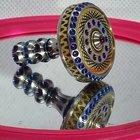Well, Aaron, I'm with Odie - it depends on your definition of going Pro. to me, a Pro would be someone that makes their entire living at it, in business (and possibly even with employees) whose profits pay their entire annual salary and primary income source. I've been back into turning (and flatwork) for just over a year now, this past year my first at selling (Farmer's Markets, Bazaars, and local artisan center) but no where near to being profitable, much less making a living at it. On the other hand, in just the short year I've been doing this, I do seem to have somewhat of a market to make it into a "sideline" business which might make enough to cover expenses (and maybe even turn a small profit) so I do plan on taking some steps to "formalize" it as a business, as opposed to a hobby. (as a business, I can deduct expenses including partial utilities, shop heat etc that would otherwise not be deductible against the income of a hobby) Just the basic steps, and keep detailed, meticulous books (trust me, sooner or later SOME government entity is going to want to audit you - whether it be income tax or sales tax or some other thing but you need to have every penny fully documented - gummint folks just love paper, dont they?) I'd call it Semi-Pro (maybe can further break it down similar to minor leagues - Class A, AA and Triple A before they step up to the majors)
Myself I make what I enjoy , whatever strikes my fancy , and I have found that what sells great for other folks (Read: Youtubers with their "5 simple projects that sell!". yeah, right.) may not sell so well for you.. so, make what you like, make what interests you - and see how the markets treat you (local farmer's market? VFD craft shows? other little rural vendor fairs? most might only run for a few hours out of a single day like all the ones I've been to - 9 AM to Noon or 12:30 to 4:30 , 9 AM to 2, etc etc. most of those smaller venues have relatively cheap booth fees, if any, and if it is like a regular weekly farmer's market you may find some friendships forming with the other vendors as well - I've been asked to be sure and return to both of our local farmer's markets in the spring - one's weekly, one's once a month) You may find some items you like or enjoy might be enormously popular , and others might be "limited interest" and be prepared to say "No" (I will turn down any projects that are bigger than I could easily lift and carry into a car, so no cabinetwork, furniture, etc for me, much as I might also enjoy it, my back won't let me) For me, it has been worth it to go to the markets (probably paid for maybe a quarter of my tool investment last year) However I don't think I'll ever do "Pro" level business - that'd be way too much time and effort for me, and definitely would kill any enjoyment I have in woodworking.

